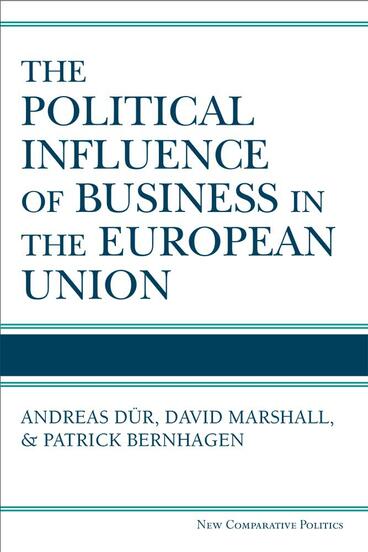The Political Influence of Business in the European Union
Counters the notion that business interests control EU policy by showing how information controls lobbying
Description
Many citizens, politicians, and political activists voice concern about the political influence of business in the European Union. But do business interests really pull the strings in Brussels? Contrary to expectations, this book shows that business interests are no more influential than other interests in shaping contemporary EU policies. Andreas Dür, David Marshall, and Patrick Bernhagen present an original argument that stresses the role of public actors in facilitating or impeding interest groups’ lobbying success. Novel data on a large number of legislative proposals on the EU’s agenda and three case studies present strong support for this argument. The Political Influence of Business in the European Union offers new insights into how lobbying success depends on the demand and supply of information, as well as new ideas on how to measure lobbying success. The book advances a fresh perspective on the question of business power and shows why business interests often lose in the policy struggle.
Andreas Dür is Professor of International Politics at the University of Salzburg. David Marshall is Lecturer in Comparative Politics at the University of Reading. Patrick Bernhagen is Professor of Comparative Politics at the University of Stuttgart.
Reviews
“This book is worth the price of admission just for the methodologies so clearly explained in chapter 3 exploring how to measure lobbying success. It is certain to be of interest to anyone concerned with business influence in the EU or in how to do good social science. It is full of important substantive, theoretical, and methodological insights.”
—Frank R. Baumgartner, University of North Carolina at Chapel Hill
“The authors offer a compelling argument about what ‘lobbying success’ actually is. Organized interests’ success should be judged relative to their own original preferences, not simply whether others collectively succeeded in changing or defending the status quo. They support this argument with innovative empirical analyses of interest group activity in Brussels. This will be an essential title for anybody interested in lobbying in the EU and beyond.”
—Tim LaPira, James Madison University
“The subject of business power in contemporary politics is always fraught with a mix of both hyperbole and rich theorization. Less often are claims about business power analytically put to the test. The Political Influence of Business in the European Union dives into the question of business power through an innovative series of empirical analyses that shed new light on the subject. This book is sure to raise some eyebrows regarding its main findings. Yet it is the particular methods, and the rigors of the analysis undertaken, that stands out as an exemplary demonstration of creative social inquiry. Dür, Marshall, and Bernhagen are already among the most esteemed researchers working on the study of business power. This study cements their reputation. One of the best scholarly books on this subject in recent years.”
—Kevin Young, University of Massachusetts

